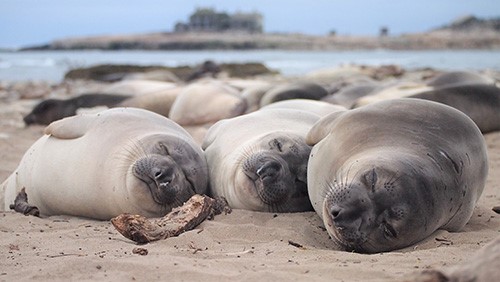For the first time, scientists have recorded brain activity in a free-ranging, wild marine mammal, revealing the sleep habits of elephant seals during the months they spend at sea.
The new findings, published April 20 in Science, show that while elephant seals may spend 10 hours a day sleeping on the beach during the breeding season, they average just 2 hours of sleep per day when they are at sea on months-long foraging trips. They sleep for about 10 minutes at a time during deep, 30-minute dives, often spiraling downward while fast asleep, and sometimes lying motionless on the seafloor.
Photo: Jessica Kendall-Bar
First author Jessica Kendall-Bar led the study as a UC Santa Cruz graduate student working with Daniel Costa and Terrie Williams, both professors of ecology and evolutionary biology at UCSC.
“For years, one of the central questions about elephant seals has been when do they sleep,” said Costa, who directs UCSC’s Institute of Marine Sciences. Costa’s lab has led the UCSC elephant seal research program at Año Nuevo Reserve for over 25 years, using increasingly sophisticated tags to track the movements and diving behaviour of the seals during their foraging migrations, when they head out into the North Pacific Ocean for as long as 8 months.
“The dive records show that they are constantly diving, so we thought they must be sleeping during what we call drift dives, when they stop swimming and slowly sink, but we really didn’t know,” Costa said. “Now we’re finally able to say they’re definitely sleeping during those dives, and we also found that they’re not sleeping very much overall compared to other mammals.”
In fact, during their months at sea, elephant seals rival the record for the least sleep among all mammals, currently held by African elephants, which appear to sleep just two hours per day based on their movement patterns.
“Elephant seals are unusual in that they switch between getting a lot of sleep when they’re on land, over 10 hours a day, and two hours or less when they’re at sea,” said Kendall-Bar, who is currently a postdoctoral fellow at UC San Diego’s Scripps Institution of Oceanography.
The full peer-reviewed journal paper in Science can be read here.
